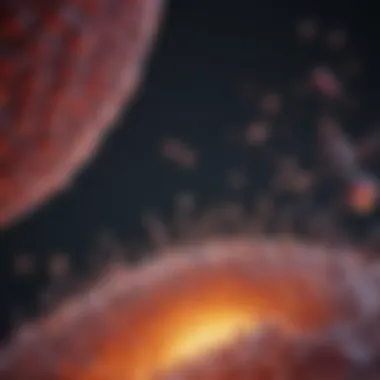Boosting Immune Function Against HPV Infections


Intro
The immune system plays a vital role in our health, acting as a complex network designed to fend off infections, including those caused by viruses like human papillomavirus (HPV). While many people associate HPV primarily with its association to cervical cancer, it actually encompasses various strains that can lead to different health issues. Because of this, understanding how to enhance immune response against HPV can carry enormous significance.
This article explores multiple facets of boosting immune function, highlighting how factors such as nutrition, lifestyle choices, and emerging therapeutic strategies contribute to effective HPV management. By examining recent scientific findings and suggestions, we aim to provide readers, whether they are students or professionals, with a well-rounded perspective on this crucial subject.
Research Overview
In navigating the complex interplay between the immune system and HPV, our goal is to shine a light on vital research findings.
Summary of Key Findings
Research indicates that individuals with a robust immune response are better positioned to spontaneously clear HPV infections. Studies have shown:
- Enhanced immune markers correlate with lower risk of persistent HPV.
- Nutritional factors such as high antioxidant intake can support immune function.
- Lifestyle choices, including smoking cessation and regular exercise, play a significant role in immune health.
Research Objectives and Hypotheses
This article aims to dissect the evidence supporting immune boosting strategies to combat HPV-related complications. Specific objectives include:
- Investigating various lifestyle modifications and their impact on immune response.
- Analyzing the role of specific nutrients in enhancing immune function.
- Evaluating emerging therapeutic approaches that have demonstrated effectiveness against HPV.
Methodology
Understanding the scientific rigor behind these findings is essential.
Study Design and Approach
A systematic review approach is chosen to collate recent studies examining the immune response in relation to HPV. By including both qualitative and quantitative studies, the aim is to cover a breadth of information that examines the nuances of immune interaction with HPV across different populations.
Data Collection Techniques
Data from various academic databases was used, focusing on peer-reviewed articles. Keywords like "HPV immunity", "nutrition and immune response", and "lifestyle and HPV" were utilized for better search results. Additionally, relevant articles from established health organizations provided supplementary data, enriching the analysis.
It’s clear that there's more to HPV than meets the eye, making this exploration of immune function crucial for comprehending its implications on public health.
Foreword to HPV and Its Implications
Human Papillomavirus (HPV) is a term that carries not just a scientific weight, but a societal one as well. Understanding its implications is crucial not only for individuals but also from a public health perspective. As we dive deeper into this topic, we shed light on the complex interplay between HPV infection and immune response, uncovering potential strategies to enhance our defenses against it.
Understanding Human Papillomavirus
Human Papillomavirus encompasses more than 150 types, with some being benign and others linked to serious conditions like cervical cancer. Most people encounter this virus at least once in their life, often without realizing it. Most HPV infections are transient and asymptomatic, but persistent infections with high-risk strains can lead to significant health issues. This dichotomy highlights the crucial role of the immune system in clearing the virus. It’s not just about knowing the virus exists; it’s about understanding how it operates and what makes it tick.
When a person’s immune response is robust, it can often eliminate these infections before they manifest into something more serious. However, variations in immune function, influenced by genetics, lifestyle, and environment, can lead to varied outcomes in HPV infections.
Public Health Impacts of HPV
The public health implications of HPV are profound and far-reaching. Globally, it's recognized as the most common sexually transmitted infection. As a result, HPV significantly burdens healthcare systems, given that it is a precursor to several malignancies. The World Health Organization has emphasized the need for vaccination and regular screening programs not only to curb the rising incidence but also to alleviate the overall healthcare costs associated with treating HPV-related diseases.
- Raising Awareness: Increasing awareness about HPV is essential for prevention. Knowledge fuels responsible sexual practices and promotes vaccination.
- Impact on Quality of Life: Beyond physical health, HPV can affect mental and emotional well-being, highlighting the need for comprehensive support systems.
"Preventive measures like vaccines and screening are our frontline weapons in the fight against HPV-related diseases."
In light of these factors, enhancing our immune response becomes imperative. By exploring the intricate relationship between virus and host immunity, we can glean insights into effective strategies for tackling HPV. The subsequent sections will delve deep into how our lifestyle choices, nutritional habits, and emerging therapies can play a pivotal role in strengthening our defenses.
The Role of the Immune System in Virus Defense
The immune system acts as the body's gatekeeper against a multitude of pathogens, including the human papillomavirus (HPV). Its role is paramount not solely in preventing infections but also in managing ongoing battles against established virus strains. A robust immune response is essential for limiting the spread and impact of HPV, which is noted for its association with various cancers. Understanding this dynamic is crucial in developing strategies for enhancing immune response to better combat HPV.
When addressing HPV, the effectiveness of the immune system can dictate the outcome of an infection, shaping the risk of progression to related diseases. This point is often underestimated; many may believe that vaccination alone is enough to provide protection, yet without a functional immune system, the body may not mount an adequate response to infections. Thus, recognizing how immunity functions and its implications can fundamentally alter our approach to HPV management.
In addition to direct defense, the immune system's memory cells play a vital role. After an initial encounter with HPV, these cells hold information that allows for a more rapid response to re-infection. Therefore, fostering a robust immune system can lead to quicker, more effective reactions to any future exposure to HPV. A well-rounded strategy that combines lifestyle adjustments, nutrition, and emerging therapies can empower individuals to enhance their immune defense against HPV.
Components of the Immune System
The immune system is a complicated network comprising various components working synergistically to protect the body. Notably, several key players can be highlighted:
- White Blood Cells (Leukocytes): These cells are the frontline soldiers, divided into several types, including lymphocytes (T cells and B cells), neutrophils, and macrophages. T cells directly attack virus-infected cells, while B cells produce antibodies that neutralize pathogens.
- Antibodies: These proteins identify and bind to specific antigens on the virus, marking them for destruction. This is instrumental in curtailing infections and preventing the virus from multiplying.
- Complement System: A series of proteins in the blood that enhance the ability of antibodies to clear pathogens and help destroy cells infected by viruses.
Equipped with this diverse arsenal, the immune system is well-prepared to identify and combat a variety of pathogens, including HPV.


How Immunity Responds to HPV
When HPV enters the body, the immune response is triggered quickly. The innate immune system, which serves as the first line of defense, recognizes the virus through specific pattern recognition receptors. These receptors identify viral components and initiate a general immune response, which helps limit the infection in its early stages.
Once this initial response takes place, the adaptive immune system ramps up. This process can take longer but is more tailored and powerful:
- Recognition: HPV-specific T cells recognize infected cells and begin to proliferate. This recognition is key in controlling and eliminating infected cells.
- Memory Formation: After battling the infection, some T and B cells will persist long-term, creating a memory that can respond swiftly to any future HPV exposure. This memory aspect is crucial in preventing re-infection, underscoring the significance of a strong immune response.
- Cytokine Release: T cells also release cytokines, signaling molecules that help regulate immune responses, including the activation of macrophages to clear away dead cells and debris from the infection.
The interplay between the innate and adaptive immune systems illustrates the complexity of the immune defense against HPV. However, several factors can disrupt this process, including genetic predispositions and lifestyle choices. Ensuring that the immune system is functioning optimally is vital for effectively combating HPV and reducing related health risks.
Factors That Influence Immune Function
Understanding the factors that shape immune function is pivotal in the context of HPV management. Our immune system does not operate in a vacuum; it interacts dynamically with various intrinsic and extrinsic elements. With the rise of HPV-related diseases, it becomes vital to investigate these influences closely. Factors like genetics, environmental conditions, and lifestyle choices all play a fundamental role in determining how effectively our immune system can fight off infections.
To enhance our immune response effectively against HPV, we must consider each of these elements. The nuances within genetic predispositions, varying environmental contexts, and the everyday decisions we make give us both advantages and challenges. Grasping these concepts can empower us to take informed steps towards optimizing immune health.
Genetic Factors and Immune Response
Genetic factors form the foundation of our immune response. Each individual's immune system is shaped by a complex interplay of genetic makeup that dictates how we respond to pathogens, including HPV. Some individuals may carry genetic variations that render their immune systems more resilient, while others might possess susceptibilities. Genes controlling cytokine production, for instance, can greatly affect how our body mobilizes defenses against infections.
Moreover, studies indicate that certain genetic markers could help predict HPV outcomes. For instance, specific human leukocyte antigen (HLA) alleles have been linked to enhanced or diminished HPV clearance. These findings underline a critical point: understanding one's genetic background can provide insights into susceptibility to HPV and may influence preventive strategies.
Environmental Influences on Immunity
Environmental factors also play a significant role in shaping our immune landscape. Exposure to pollutants, toxins, and even varying climates can impact immune function. For instance, living in urban areas with higher pollution levels has been associated with increased inflammation and a suppressed immune response.
Moreover, the abundance of pathogens present in different environments can either challenge or fortify the immune response. Continuous exposure to diverse microorganisms might enhance immunity through a process known as immunological training. This evolutionary phenomenon suggests that a well-exposed immune system responds better when faced with specific pathogens, including HPV.
Lifestyle Choices That Impact Immune Health
Lifestyle choices are arguably among the most direct ways individuals can influence their immune health. Decisions regarding nutrition, physical activity, stress management, and sleep hygiene all contribute to the robustness of our immune response against HPV.
Nutrition
Nutrition serves as the cornerstone for immune health. A balanced diet rich in vitamins, minerals, and antioxidants fosters the body’s defense mechanisms. Key nutrients such as vitamin C, zinc, and polyphenols have shown promise in enhancing the immune response.
One standout example is the role of vitamin C, which is known for its antioxidant properties and ability to stimulate the production of white blood cells. Moreover, a diet that includes plenty of fruits and vegetables supplies various phytonutrients that support immunity.
The challenge lies in maintaining such a diet amidst modern lifestyle pressures. Processed foods laden with sugars can weaken immune responses. Thus, focusing on whole foods, seasonal produce, and adequate hydration is a beneficial approach for bolstering defense against HPV.
Physical Activity
Engaging in regular physical activity has a profound impact on immune function. Even moderate exercise boosts the circulation of immune cells throughout the body, fostering quicker responses to threats such as HPV.
Research shows that consistent, moderate-intensity exercise can lead to a more adaptive immune system, enhancing its ability to fend off infections. On the flip side, excessive training or sedentary lifestyles can both negatively impact immune health. Striking a balance is essential, making regular activity a key component in the battle against viral infections.
Stress Management
Stress management is another critical factor in immune health. Chronic stress can lead to the overproduction of cortisol, which suppresses immune responses. Techniques like mindfulness, meditation, and yoga not only help reduce stress but can also improve the body's capacity to respond to HP virus.
Balancing daily responsibilities while prioritizing stress management offers a tangible path to working against immune suppression. Programs focusing on mindfulness have shown effectiveness in enhancing immune activity.
Sleep Hygiene
Lastly, sleep hygiene cannot be overlooked. Quality sleep is restorative and essential for optimal immune function. It affects everything from the production of protective cytokines to the efficacy of vaccinations.
Most adults need 7 to 9 hours of sleep per night, and insufficient sleep can significantly impair immunity. Developing a steady sleep routine, limiting blue light exposure before bed, and ensuring a comfortable sleep environment can cultivate better sleep habits, thereby boosting immunity against HPV.
Nutritional Strategies for Boosting Immunity
Nutritional strategies for boosting immunity involve carefully considering what we put into our bodies. It’s well-known that a strong immune system is pivotal in fighting off infections, and when it comes to Human Papillomavirus (HPV), maintaining optimal immune health is especially crucial. A balanced diet rich in essential nutrients can enhance immune function, potentially paving the way for better management of HPV-related conditions.
The significance of nutritional interventions in enhancing immune response cannot be overstated. Various vitamins, minerals, and antioxidants play integral roles in supporting immune cells and their functions. Moreover, adopting specific dietary patterns can further bolster our body's defenses.
Essential Nutrients and Their Roles
Vitamins
Vitamins serve as the building blocks of a healthy immune system. For instance, Vitamin C is famed for its role in producing white blood cells, which are essential fighters against infections. Its key characteristic lies in its ability to act as a powerful antioxidant that combats oxidative stress, a common issue in viral infections like HPV.
One unique feature of certain vitamins, particularly Vitamin D, is its impact on immune regulation. Studies highlight that adequate levels of Vitamin D are linked to improved immune response, making it a popular choice among those aiming to enhance immunity. However, it’s worth noting that too much Vitamin D can lead to complications, showcasing the importance of balance in vitamin intake.


Minerals
Minerals, too, are essential players in the immunity game. Zinc stands out as a critical mineral in immune function. Its specific aspect relates to its role in many enzymatic reactions, particularly those that help white blood cells function effectively. Zinc’s key characteristic is its potential to shorten the duration of colds — a clear indicator of its immune-supportive properties.
One of the unique features of minerals is how they can be found in various whole foods, making access easier. While most people can obtain sufficient amounts of zinc from their diets, deficiencies can lead to weakened immune responses, underlining just how important these nutrients are.
Antioxidants
Antioxidants are another group of nutrients that warrant attention. Their specific aspect lies in their ability to neutralize free radicals, substances that can cause cellular damage and increase the risk of illness. Vitamins A, C, and E are among the most recognized antioxidants, known for their roles in protecting the body.
Their key characteristic of battling oxidative stress makes antioxidants beneficial for those looking to safeguard their immune system. Unique to antioxidants is that they often come from colorful fruits and vegetables, encouraging a varied diet. However, it's notable that while supplements can offer a boost, obtaining these nutrients through food is generally more advantageous for overall health.
Dietary Patterns Supporting Immune Health
Implementing specific dietary patterns can provide a strong foundation for enhancing immune function. Whole-food, plant-based diets rich in fruits, vegetables, nuts, and whole grains not only supply essential nutrients, but also foster gut health — a crucial component of immune response. Furthermore, incorporating fermented foods might help nurture a balanced microbiome, reinforcing immunity.
"Investing in our diets is an investment in our health."
In summary, by focusing on nutrient-rich foods and adopting sensible dietary patterns, individuals can potentially elevate their immune health, creating a more resilient front against HPV and other infections.
Exercise and Immune Enhancement
When discussing ways to bolster the immune system in the context of combatting HPV, it is crucial to highlight the role of exercise. Engaging in regular physical activity doesn't just keep you in shape; it has profound effects on the immune system, making it a powerful ally against infections. The interplay between exercise and immunity can help people resist infections, reduce inflammation, and even enhance vaccine efficacy.
Mechanisms of Exercise-Induced Immunity
The mechanisms through which exercise supports immune response are quite fascinating. First off, when you exercise, your body increases blood circulation. This enhanced circulation allows immune cells to travel more swiftly throughout the body, responding to potential threats much quicker than they would at rest. This certainly can be likened to sending in reinforcements to a battle front – quicker response time could mean the difference between catching a threat early or facing a larger problem later.
Furthermore, exercise stimulates the release of hormones such as epinephrine and norepinephrine. These hormones can modulate the production and function of various immune cells, including T cells and natural killer cells. These cells are the first responders, and their increased activity aids in identifying and eliminating HPV-infected cells before they can proliferate. Think of them as the front-line soldiers guarding the gates.
Also, regular physical activity can lower levels of stress hormones like cortisol, which can be detrimental to immune function when present in high amounts. Chronic stress is akin to trying to walk through a minefield without a map, leaving one vulnerable to various health issues, including HPV. Exercise can help clear that minefield, making it easier for your body to mount a robust defense against viruses.
Best Practices for Physical Activity
To reap the immunological benefits of exercise, it's essential to establish a routine that promotes both physical and mental well-being. Here are some best practices to consider:
- Aim for consistency: Try to engage in moderate exercise for at least 150 minutes a week. This doesn’t have to be a chore; find activities you enjoy, whether it’s brisk walking, cycling, or dancing.
- Mix it up: Incorporate different forms of exercise, including aerobic, strength training, and flexibility exercises. This comprehensive approach not only combats boredom but also promotes different facets of health and immunity.
- Listen to your body: Pushing through fatigue can be counterproductive. If your body feels drained or you’re under the weather, it’s okay to take a step back. Recovery is as critical as activity.
- Incorporate short bursts: If time is tight, consider high-intensity interval training (HIIT). Just a few minutes of intense activity can ramp up your heart rate and enhance immune functions significantly.
- Stay social: Exercising with a friend or joining a class can provide motivation and emotional support, which are vital for sticking to a routine.
Regular exercise isn’t just about looking good; it’s an investment in your immune health, especially when it comes to fighting off HPV-related complications.
Emerging Therapies for Immune Modulation
The landscape of immunology is constantly evolving, and emerging therapies for immune modulation offer new frontiers in combating HPV. These therapies harness the body's own immune responses to recognize and fight off the virus more effectively. What adds a significant layer of complexity is that HPV can sometimes evade the immune system, so targeting these evasive tactics is crucial in enhancing overall immune function. The advent of innovative treatments aids individuals in harnessing their immune response and opens up avenues for personalized healthcare strategies.
Immunotherapy in HPV Treatment
Immunotherapy appears as a beacon of hope in the treatment of HPV, particularly for those who may be experiencing complications such as cervical dysplasia or even cancer. This treatment involves employing the body’s immune system to combat abnormal cells, recognizing that the immune response can be initiated or augmented to target HPV more efficiently.
There are several methods utilized in immunotherapy:
- Checkpoint Inhibitors: These agents block proteins that prevent immune cells from attacking cancer cells. By inhibiting these checkpoints, the immune system is unleashed to fight off HPV-infected cells effectively.
- Therapeutic Vaccines: Unlike preventive vaccines that aim to stop HPV infections, therapeutic vaccines work by stimulating a person's immune response against already infected cells. These vaccines often focus on the E6 and E7 proteins of HPV, which are crucial for the virus's ability to cause cancer.
Benefits include an increase in the immune response specificity towards the HPV-infected cells while potentially leading to fewer side effects than conventional treatments like chemotherapy. However, considerations such as the patient's individual health profile and the specific HPV strains involved must be addressed.
"Immunotherapy represents a paradigm shift, turning the immune system into a potent weapon against persistent infections and malignancies."
Vaccination Strategies and Their Impact
The importance of vaccination in the fight against HPV cannot be overstated. The landscape of HPV prevention has been evolving due to ongoing research and developments in vaccine technology. Vaccination strategies are central to interrupting the transmission chain of HPV and protecting individuals from associated diseases.
There are two primary vaccine types:
- Preventive Vaccines: These are designed to shield individuals from infections by the most common and high-risk HPV types, especially types 16 and 18, which are commonly associated with cervical cancer.
- Therapeutic Vaccines: While preventive vaccines are predominantly known for their role in prevention, therapeutic vaccines are starting to gain traction, offering hope to those already infected by eliciting an immune response against existing HPV.
The impact of vaccination strategies can be observed broadly. Not only do they aim to reduce the prevalence of HPV infections, but they also play a significant role in lowering the incidence of HPV-related cancers globally. Nevertheless, successful implementation hinges on public awareness, accessibility to vaccines, and education about the benefits of getting vaccinated.
Furthermore, regularly assessing the effectiveness of vaccination strategies against varying HPV strains is vital for the continual adaptation of public health initiatives. Adequate understanding and proactive measures reflect vital keys in the ongoing battle against HPV.
The Importance of Early Detection
Early detection stands as a critical pillar in managing health outcomes related to human papillomavirus (HPV) infections. The sheer multitude of strains associated with HPV often complicates the landscape of screening and intervention. Among these strains, only a subset is linked to serious complications such as cervical cancer. Consequently, knowing one's HPV status early can profoundly influence treatment decisions and overall long-term prognosis.


Identifying HPV at an initial stage provides numerous advantages. First, it allows for timely monitoring and intervention, which can preempt more severe outcomes like cancer. Secondly, early detection contributes to the understanding of the immune response. A well-functioning immune system can clear many HPV infections without intervention. Thus, determining whether an individual can rely solely on their immune response or requires additional therapies is imperative.
Furthermore, an early diagnosis can pave the way for enhanced public health strategies. For instance, information gathered from screening can inform healthcare providers about prevalent strains in a given community, leading to targeted education and prevention efforts.
Benefits of Early Detection
- Timely Intervention: Catching HPV early allows for immediate treatment options, decreasing risks associated with advanced disease stages.
- Monitoring Immune Response: Assessing how one's immune system deals with HPV can guide future therapies.
- Public Health Awareness: Data from screenings can foster awareness and possibly reduce HPV transmission rates among the populace.
Considerations for Early Detection
It's not just about getting tested; how and when to test also plays a significant role. For many adults and adolescents, having a conversation with a healthcare provider about sexual health and preventative measures is a vital first step. In this evolving landscape, education and access to screening options must remain priorities.
"Early detection is not just a medical service; it's an essential strategy in safeguarding individual health and strengthening community immunity against HPV."
Screening Methods for HPV
Screening for HPV is pivotal in uncovering infections that might otherwise go unnoticed. Key methods include:
- Pap Smears: Often combined with HPV testing, this method helps detect cell abnormalities in the cervix that may indicate precancerous changes.
- HPV DNA Testing: This test identifies the presence of high-risk HPV types. It's recommended for women aged 30 and above, either alone or in conjunction with Pap tests.
New Advances in Screening Technology
Recent developments in molecular biology have spurred innovations in screening methodologies. For instance, liquid-based cytology has gained traction, allowing for more accurate assessments of cervical cells, thereby enhancing early detection capabilities.
Linking Screening to Immune Responses
Linking the screening outcomes to how the immune system responds to HPV is not merely a side note; it’s crucial to understanding the infection dynamics. When individuals know their HPV status, they can better comprehend their immune capabilities.
- Predictive Value of Immune Responses: Studies have shown that those with robust immune responses often clear HPV more efficiently. This serves as a crucial metric in determining follow-up care after initial screening.
- Tailoring Treatments: Those with a compromised immune response may need heightened vigilance. Knowledge of HPV screening can allow healthcare professionals to tailor treatment approaches better suited to an individual's immune landscape.
In essence, regular screening combined with an understanding of immune responses represents a proactive approach to HPV management. This dual perspective not only enhances awareness but also empowers individuals, providing them with the tools necessary to make informed health decisions. By intertwining screening with knowledge of immune function, we foster a holistic approach to combatting the impact of HPV.
Practical Approaches for Individuals
Understanding how to enhance immune response against HPV is crucial for individuals looking to protect their health. This section delves into practical strategies that are actionable and tailored to fit various lifestyles. The benefits of these approaches go beyond just combating HPV; they promote overall well-being and resilience against other pathogens as well. By integrating these strategies into daily routines, individuals can bolster their immune responses in a deliberate and personalized manner.
Creating a Personalized Health Plan
Personalization is key when it comes to health. A well-rounded health plan should encompass several areas:
- Dietary Choices: It’s essential to focus on a nutrient-dense diet rich in vitamins A, C, D, and E as well as zinc and selenium. Foods such as citrus fruits, nuts, leafy greens, and fatty fish play a vital role in supporting immunity.
- Physical Activity: Regular exercise not only benefits physical health but enhances immune function too. It’s not about pumping iron; even moderate activities like walking or yoga can make a significant impact.
- Stress Management: Chronic stress can derail immune function. Techniques such as mindfulness, meditation, or simple breathing exercises can help keep stress levels in check.
- Sleep Hygiene: Lack of sleep negatively affects immune responsiveness. Aim for 7 to 9 hours of quality sleep per night, which can repair and rejuvenate the body.
Developing this health plan involves evaluating personal circumstances and preferences. Consider consulting with healthcare professionals to adapt these strategies effectively and make informed choices.
Resources for Further Learning and Support
Education empowers individuals to take charge of their health. There are many resources available that provide valuable insights:
- Websites and Online Platforms: Websites like Wikipedia and Britannica offer clear explanations and articles on HPV and related health topics.
- Support Groups and Forums: Online communities on platforms such as Reddit provide platforms for sharing experiences, advice, and tips regarding HPV and immune health. Connecting with others who share similar challenges can be both comforting and informative.
- Books and Research Publications: Engaging with literature focused on immunology and HPV can provide deeper insights. These materials often delve into cutting-edge research and emerging therapies that might be beneficial.
- Healthcare Providers: Always consider working with healthcare professionals for personalized guidance and support tailored specifically to individual needs. They can offer recommendations based on current health status, facilitating a more effective personal health plan.
Empowering yourself through knowledge is one of the strongest defenses you have against HPV and other health concerns.
In summary, taking a proactive approach towards enhancing your immune response is essential for combating HPV. By creating a personalized health plan and utilizing available resources for further learning and support, individuals can position themselves not only against HPV but foster a healthier body overall.
Culmination and Future Perspectives
The topic of enhancing immune response in the context of HPV is crucial, not only for individuals who may be affected but for public health at large. Given that HPV is often asymptomatic yet prevalent, understanding how to bolster the immune system can yield significant benefits. By adopting a multi-faceted approach that combines nutritional strategies, lifestyle modifications, and potential therapies, we can create a solid framework for HPV management.
Key Benefits:
- Empowerment through Knowledge: Individuals can take control of their health by being informed about how their immune system can combat HPV effectively.
- Community Health Improvement: As more people become proactive in their health management, the overall impact on HPV-related infections could lessen, leading to lower transmission rates.
- Integration of Advances: The pathway forward includes using emerging therapies, such as advanced immunotherapies, that may soon be available to enhance the immune response.
It’s essential to recognize the importance of personal health plans tailored to individual needs. Emphasizing preventive measures, early detection, and health education plays a vital role in tackling HPV head-on. Collaborative efforts among physicians, researchers, and health educators are paramount to drive awareness and understand the complex dynamics of HPV infections in relation to the immune response.
"The path to better health is paved with informed decisions and proactive management."
Recapping Key Insights
As this article has demonstrated, several insights stand out that are vital for mastering the subject of HPV and immune response:
- Interaction of HPV and Immunity: The immune system's interaction with HPV can significantly influence the outcomes of infections.
- Nutritional Interventions: Essential nutrients like vitamins A, C, and D play critical roles in supporting immune function, particularly in viral infections.
- Lifestyle Factors: Regular physical activity, stress management, and good sleep hygiene contribute to a potent immune response.
- Emerging Therapies: The landscape of immunotherapy is evolving, making it an exciting frontier in HPV treatment.
Recognizing these insights equips individuals with the necessary tools and understanding to enhance their immune systems proactively.
The Path Forward in HPV Management
Moving forward, a strategic approach toward HPV management necessitates:
- Integrating Personalized Health Plans: Each person’s health strategy should take into account their unique health conditions, lifestyle, and dietary preferences to maximize effectiveness.
- Emphasizing Preventive Actions: Routine screenings and vaccinations are essential in early detection and prevention of HPV-related diseases.
- Promotion of Research: Continued investment in research can lead to innovative therapies and safety profiles that could revolutionize HPV management.
- Community Engagement: Fostering an environment where individuals feel supported and empowered to discuss their health choices is vital.
- Education and Awareness: Informing the public about HPV and its implications should be a continuous effort, laying the foundation for broader community understanding and advocacy.















